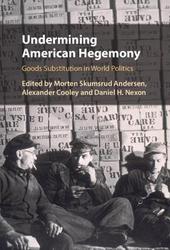
|
Undermining American Hegemony: Goods Substitution in World Politics
Hardback
Main Details
| Title |
Undermining American Hegemony: Goods Substitution in World Politics
|
| Authors and Contributors |
Edited by Morten Skumsrud Andersen
|
|
Edited by Alexander Cooley
|
|
Edited by Daniel H. Nexon
|
| Physical Properties |
| Format:Hardback | | Pages:270 | | Dimensions(mm): Height 236,Width 158 |
|
| Category/Genre | Political economy |
|---|
| ISBN/Barcode |
9781108844970
|
| Classifications | Dewey:327 |
|---|
| Audience | | Professional & Vocational | |
|---|
| Illustrations |
Worked examples or Exercises
|
|
Publishing Details |
| Publisher |
Cambridge University Press
|
| Imprint |
Cambridge University Press
|
| Publication Date |
3 June 2021 |
| Publication Country |
United Kingdom
|
Description
Advancing a new approach to the study of international order, this book highlights the stakes disguised by traditional theoretical languages of power transitions and hegemonic wars. Rather than direct challenges to US military power, the most consequential undermining of hegemony is routine, bottom-up processes of international goods substitution: a slow hollowing out of the existing order through competition to seek or offer alternative sources for economic, military, or social goods. Studying how actors gain access to alternative suppliers of these public goods, this volume shows how states consequently move away from the liberal international order. Examining unfamiliar - but crucial - cases, it takes the reader on a journey from local Faroese politics, to Russian election observers in Central Asia, to South American drug lords. Broadening the debate about the role of public goods in international politics, this book offers a new perspective of one of the key issues of our time.
Author Biography
Morten Skumsrud Andersen is a Senior Research Fellow at the Norwegian Institute of International Affairs (NUPI), in the Research group on Global order and Diplomacy. Andersen has published on theoretical and empirical topics of International Relations, including the history of empires and hierarchy in international politics, conceptual history, NGOs, and practice theory. Alexander Cooley is the Claire Tow Professor of Political Science at Barnard College and Director of Columbia University's Harriman Institute (2016-present). Cooley is the author and/or editor of seven academic books, serves on several international advisory boards, and has testified for the United States Congress and Helsinki Commission. Daniel H. Nexon is Professor of Government and Foreign Service at Georgetown University. He is the author or editor of three other books and the former lead editor of International Studies Quarterly. During 2009-2010 he worked in the Office of the Secretary of Defense (Policy) in the Russia, Ukraine, and Eurasia office. In 2016 he was one of two coordinators for a group of volunteers that worked on foreign policy issues for the Bernie Sanders campaign, and he remains active in debates about progressive foreign policy.
Reviews'What awaits us after American hegemony? Undermining Hegemony helps bring the bleary future into focus. Surrounding the subject to subdue it, the contributors of this volume show how ebbing U.S. influence shifts allegiances, alters autonomy, affects identities, and revises norms. But the arguments go beyond current events to enduring patterns. Anyone looking to understand how states large and small create international order should start with this book. Morton Skumsrud Andersen, Alexander Cooley, and Daniel Nexon have assembled a comprehensive work that is timely and timeless.' Joseph M. Parent, Professor of Political Science, University of Notre Dame 'This volume offers a fascinating analysis of how countries such as China and Russia are seeking to erode US-led liberal international order by contesting the United States' dominant role in providing global public goods in the economic, security and normative realm. Shedding light on the subject from several different angles, the authors succeed in deepening the reader's understanding of how political orders are maintained by the hegemon and challenged by other powers. The book thus makes a highly relevant contribution to the ongoing debate about the provision of international goods and the future of global order, a topic that has only gained importance in the context of the covid-19 pandemic.' Oliver Della Costa Stuenkel, Associate Professor, School of International Relations, Fundacao Getulio Vargas (FGV)
|